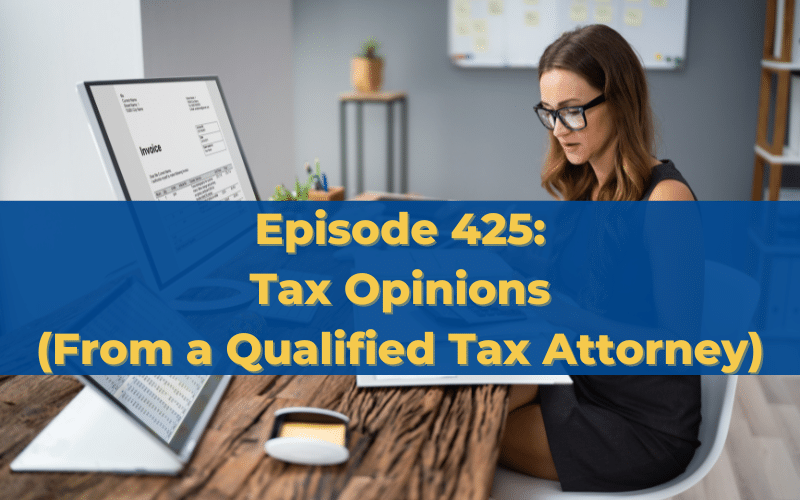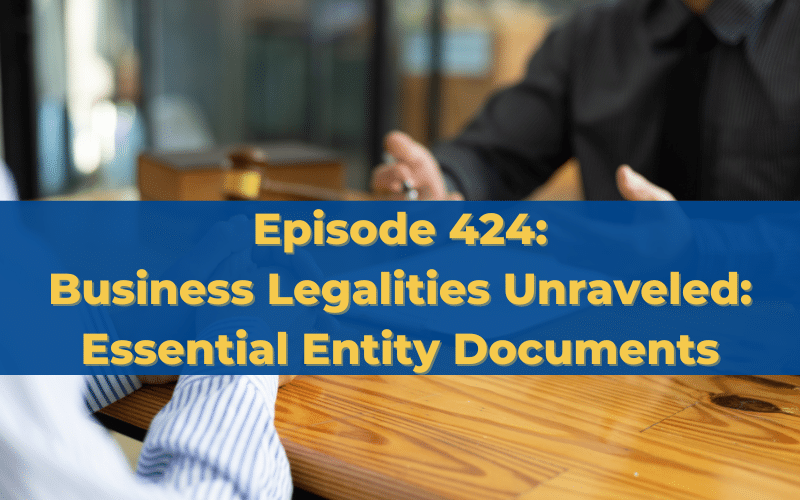Podcast: Play in new window | Download | Embed
Subscribe Apple Podcasts | RSS | Subscribe:
Everyone’s got an opinion on taxes, but only tax attorneys are qualified to give an expert opinion that holds legal weight. There are many scenarios where seeking a tax attorney’s guidance is beneficial, including the following examples:
- You need to know if a transaction qualifies as income or triggers a deduction
- You need to verify that your tax returns have been properly completed and filed
- You need to know what the tax implications are of a transaction before it is made
- You need to know if any tax complications may affect a transaction
- You need protection from tax penalties in case a transaction is revised by the IRS
In short, tax opinions by a qualified tax attorney are an important planning and protection tool for individuals and businesses. They can cover a broad range of tax-related topics and can guide people through complicated tax situations.
Why are Tax Attorneys Best Qualified to Provide Tax Opinions?
A tax accountant – even a CPA – is an excellent professional to work with for tax preparation and some tax planning services. However, tax attorneys are the experts to consult with when your tax picture is uncertain. Here is why:
- Protection in case your transaction’s categorization is disputed – In some instances, if a taxpayer files their taxes in accordance with their attorney’s advice, they will be protected from harsh penalties if that guidance turns out to be incorrect. This protection is extended to tax preparers, so if your taxes are professionally prepared and filed following the guidance of a tax attorney, both the taxpayer and their preparation specialist are protected.
- Advanced knowledge of tax laws and provisions – Tax attorneys are deeply familiar with the tax code, at the federal and state levels. They are also familiar with certain localities’ tax codes, typically in the areas where they practice. Tax attorneys also understand legal procedure when it comes to tax regulation and possible future disputes. While accountants understand how best to code the transaction or deduction on tax forms, tax attorneys understand how to argue use of that code.
A Few Examples of Transactions That Need a Tax Opinion
Tax opinions can be provided for most tax questions or concerns. Experienced tax attorneys have worked with enough clients on enough cases to provide useful guidance in an array of situations. A few common examples include:
- 1031 like-kind exchanges – 1031 like-kind exchanges come into play when selling and purchasing investment real estate. With a 1031 exchange, taxpayers may defer their capital gains taxes if they follow the qualifying rules under the IRS’s 1031 provision. These rules can be complicated (the property must qualify as like-kind, for instance) and if they aren’t followed, it can be costly.
- Business mergers and acquisitions – Business mergers and acquisitions have far-reaching and highly complex tax implications. Buyers need to know the tax basis of any assets they are purchasing to track gains or losses. Net operating losses (NOL) must be calculated and allocated to offset future tax burdens. Tax credits (carryover and refundable) and deferments are also a point of consideration, as they may be passed on to the acquiring business.
- Bankruptcies – Bankruptcies come with their own set of tax-related challenges, as people filing bankruptcy must plan how to satisfy creditors while also maintaining tax payments. Our firm regularly assists bankruptcy filers with arranging their finances, signing contracts, and negotiating with both the IRS and creditors to ensure all requirements are met. This requires plenty of informed tax opinions to get right.
These are only a few examples to illustrate when a tax opinion makes sense. As every taxpayer’s situation is unique, tax attorneys are ready to provide guidance on any tax question a client may have.
Tax attorneys may provide their opinions with varying levels of confidence. For example, an attorney may use prior case law and the tax code to demonstrate clear authority behind their opinion. When tax attorneys are confident, they will use language such as “will” and “likely”. In situations where the picture is less certain, an attorney may clarify that their opinion “should” hold or that there’s a better than 50/50 chance of it being correct. If the attorney’s opinion isn’t based on clear authority but may possibly be substantiated in court, the opinion is referred to as “non-frivolous.”
The degree of protection conferred by an attorney’s opinion depends on the confidence with which they provide it.
Three Reasons Why a Tax Opinion May Be Needed
An attorney’s tax opinion can provide valuable insight and protection, and is therefore needed in the following situations:
- When peace of mind is required – Tax opinions can provide valuable peace of mind to taxpayers facing a challenging tax situation. An attorney can help their clients achieve this peace of mind by offering informed guidance and protection from IRS penalties.
- When a contract requires it – Some parties to an agreement may require an official tax opinion regarding certain provisions in the contract before they sign.
- When it’s induced by a third party – A taxpayer may be induced to acquire an attorney’s tax opinion if there are questions, concerns, or scrutiny regarding their taxes.
Tax Concerns or Questions? An Attorney’s Tax Opinion Can Provide Needed Guidance
Whether you need a tax opinion for your own planning purposes or as part of another transaction, a trusted tax attorney can provide it. Our firm frequently helps taxpayers navigate transactions that will likely trigger tax consequences. We are well-prepared to provide an official tax opinion to those seeking clarity and peace of mind.


